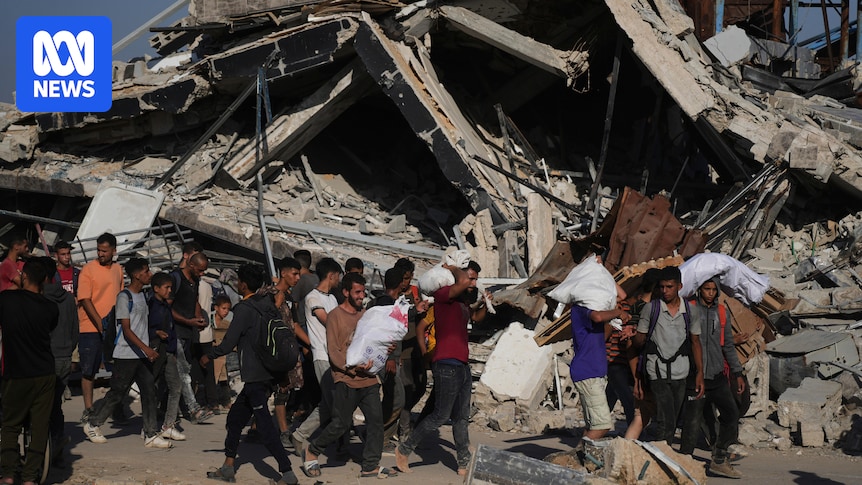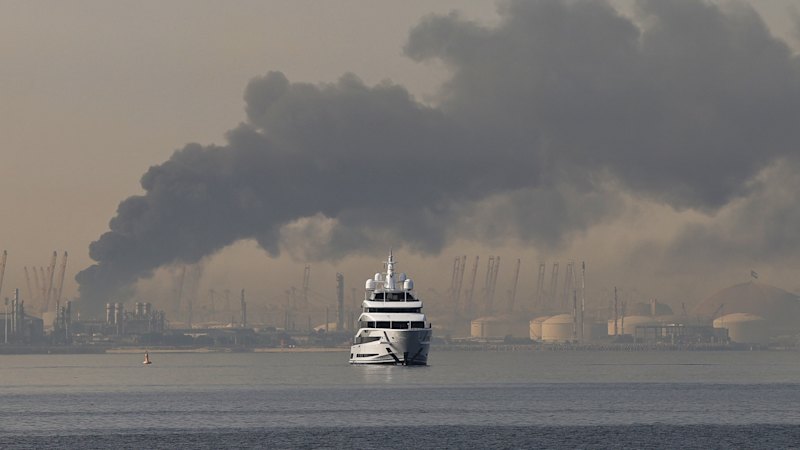
An Israeli airstrike in central Gaza has resulted in the deaths of 18 people, including members of a Palestinian police unit and civilians, according to local witnesses. The incident occurred on Thursday as a crowd gathered to receive aid, including bags of flour, confiscated from gangs looting aid convoys. Hospital officials confirmed the fatalities, marking another tragic chapter in the region’s ongoing humanitarian crisis.
The airstrike targeted a street in the town of Deir al-Balah, where members of the Sahm security unit were distributing the confiscated goods. The unit, part of Gaza’s Hamas-led Interior Ministry, had been tasked with preventing looting and cracking down on merchants selling stolen aid at inflated prices. The attack left a horrific scene, with video footage showing the aftermath of bodies, including a child and at least seven Sahm members, lying in the street.
Humanitarian Aid in Crisis
The strike highlights the severe challenges faced in distributing aid to Gaza’s population, which has been severely impacted by a blockade that restricted food supplies for over two months. Since mid-May, only limited supplies have been allowed into the territory, leading to desperate conditions and widespread looting of aid convoys.
Efforts by the United Nations to distribute food have been hampered by armed gangs and desperate crowds. The Sahm unit’s involvement in aid distribution reflects the fragmented and volatile nature of the situation, with various factions and organizations attempting to address the crisis.
Local and International Responses
In response to the looting, an association of Gaza’s clans and tribes has launched an independent initiative to protect aid convoys. The National Gathering of Palestinian Clans and Tribes claimed responsibility for escorting a shipment of flour into northern Gaza, though it remains unclear if this effort was coordinated with UN or Israeli authorities.
Meanwhile, Israeli officials, including Prime Minister Benjamin Netanyahu and Defense Minister Israel Katz, have accused Hamas of diverting aid for its purposes. In a joint statement, they called for military action to prevent such theft, a claim that the National Gathering has strongly denied, asserting that aid is being securely delivered to the population.
Escalating Violence and International Scrutiny
The airstrike in Deir al-Balah is part of a broader pattern of violence that has plagued Gaza amid the ongoing conflict between Israel and Hamas. More than 800 Gazans have reportedly been killed in Israeli Defense Forces (IDF) operations during a 12-day conflict with Iran, further exacerbating the humanitarian crisis.
Israel’s military actions have drawn international scrutiny, particularly regarding the treatment of civilians near aid distribution sites. The Haaretz newspaper reported that Israel’s Military Advocate General has ordered an investigation into potential war crimes, following allegations that Israeli forces deliberately fired on civilians near aid sites. These claims have been met with denials from the Israeli military, which insists that any force used was intended to control crowds and prevent harm.
Future Implications and Humanitarian Efforts
The situation in Gaza remains dire, with more than 500 people reportedly killed near aid centers since late May. The ongoing conflict and humanitarian crisis have prompted calls for a reevaluation of aid distribution strategies, with some advocating for a shift away from the UN-led system to prevent alleged misappropriation by Hamas.
In the meantime, the US-backed Gaza Humanitarian Foundation has begun distributing food boxes at several locations in southern Gaza, though these efforts have also been marred by violence and logistical challenges. Thousands of Palestinians continue to endure long journeys through dangerous zones to access aid, underscoring the urgent need for a sustainable solution to the crisis.
As the international community watches closely, the situation in Gaza remains a complex and volatile issue, with significant implications for regional stability and humanitarian efforts. The ongoing investigations and diplomatic efforts will likely shape the future of aid distribution and conflict resolution in the region.






